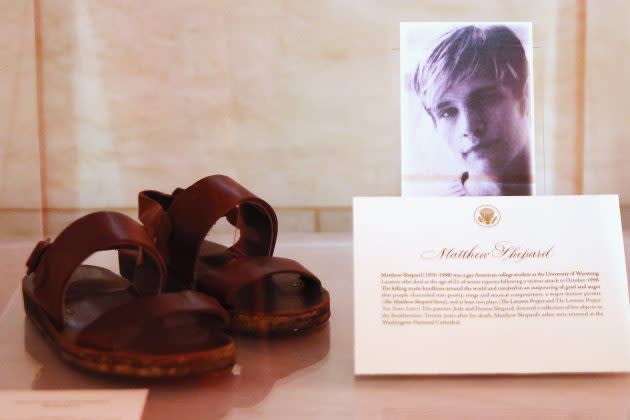Why Matthew Shepard’s Story Was So Important For Investigation Discovery to Finally Tell, 25 Years Later
- Oops!Something went wrong.Please try again later.

Jason Sarlanis is the president of Turner Networks, Investigation Discovery (ID) and HLN, linear and streaming. The two-hour documentary special “The Matthew Shepard Story: An American Hate Crime” airs Monday, Oct. 9, at 9 p.m. ET on ID (ahead of the 25th anniversary of Shepard’s death on Oct. 12).
Last week, I was sitting in a conference room at our Warner Bros. Discovery offices in Burbank presenting a PowerPoint for an ID all-hands meeting. As a network suit, it’s one of the “suit-ier” things I do. After recapping our third-quarter ratings momentum and reminding the team to sign up for our annual Volunteer Day, I shared a clip from our forthcoming documentary special, “The Matthew Shepard Story: An American Hate Crime.” While the two-minute clip played, any artifice of a corporate suit disappeared and I immediately reverted to being a closeted teenager in the ’90s, my eyes welling up with tears in front of my colleagues.
More from Variety
Like most LGBTQ youth in suburban America at the time, news of the horrific attack on Matthew terrified me. In a world before “Will & Grace” had opened hearts and minds, I couldn’t fathom how I would ever self-actualize as a happy, healthy adult while also living authentically and openly. Now, here was an example of how much hate lurked around every corner, ready to manifest into violence. This realization made the already alien idea of my future happiness seem even more impossible.
After days of his life hanging in the balance, Matthew passed away, and something changed. Whether motivated by pain, compassion, righteousness or some combination of all three, queer people and allies from every corner took to the streets and airways demanding that this young man not die in vain. For the first time, I could see that somewhere out there, people cared about us, and there was an “us” to care about.
When I was appointed head of Crime & Investigative Content at what was then Discovery Inc., one of the first questions I asked was how many times we had told Matthew’s story. Shockingly, after 13 years, more than 4,000 crimes and nearly 10,000 hours of programming, ID had never produced a single hour on this incredibly important story. With the anniversary just around the corner, I knew it was time. The scared kid who was too afraid to speak his own truth 25 years ago now had a voice and was in a position to use it.
Everyone at ID jumped right in with a collective dedication to do right by Matthew’s legacy. We knew we had to create a documentary that celebrated his life but also demonstrated the dangers of complacency to a whole new generation of viewers. While the world had come such a long way, so much work still needed to be done; a fact I would be personally reminded of while making our show.
As we were finishing up the edit, the team took a much-needed break for the 4th of July. It’s one of my favorite holidays and every year I host a small gathering to celebrate. The morning after, I woke up to a message from a friend who had attended my party the night before. It was a picture of his face, bloody and bruised with his front teeth knocked out. He had been followed out of the subway by a group of strangers jeering at him and yelling slurs. He said he was thankful that the severe concussion had caused enough memory loss, he could not recall much of the attack. It was a visceral, personal reminder that no matter how far we’ve come, the false sense of security I felt in life was just an illusion. It broke my heart.
Back in the office that week, I shared my friend’s experience in a large team meeting about our efforts around diversity, equity and inclusion. Like many media companies, Warner Bros. Discovery is actively working to be better. Often these meetings involve modules, coaching sessions and slides. (Corporate America involves a lot of slides.) Rarely does the meeting become vulnerable, personal, and real. That day it did. As I spoke about the decision we made to create this documentary, how the dangers Matthew faced years ago still very much exist, it became a clear demonstration of why efforts around inclusion matter. It’s not that ID, in its long history, would have ever objected to telling Matthew’s story. It’s that it hadn’t been in the consideration set. It took someone at the table with a diversity of life experience to even think about suggesting it. It was a perfect example of inclusion making a difference but also a warning. No matter how hard we try, our team will have its blind spots. What other stories aren’t we considering?
Which brings me back to the ID all-hands presentation I referenced in the beginning. When I choked up sharing that short clip of our documentary to the larger corporation last week, it wasn’t the deeply moving footage that got me. As any producer knows, I had seen that tape hundreds of times by that point. It was thinking about Matthew and how that young man was robbed of ever seeing the world turn into the kind of place where out gay people could stand in front of their coworkers and share their story.
We undoubtedly have a long way to go. But thanks to Matthew and the movement he inspired, the world is quite literally a better place. For that, I will be eternally grateful and continue to take seriously the responsibility of using my voice and making space for others to do the same, because Matthew no longer can.
Best of Variety
Sign up for Variety’s Newsletter. For the latest news, follow us on Facebook, Twitter, and Instagram.
